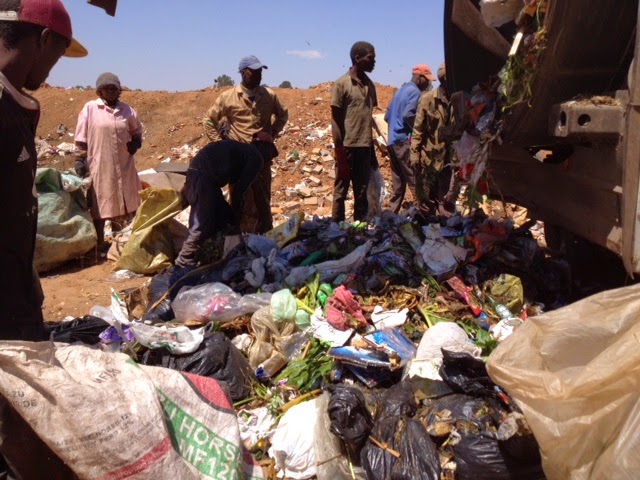Electronic
waste or e-waste is the largest growing waste stream in South Africa. With
increasing dependency on electronic appliances, the waste from electronics or
electrical equipments also increases. Sreerupa Sanyal investigates into the
current situation of this increasing, potentially harmful waste stream in South
Africa.
Imagine
a cluster of small huts with women cooking in open fires and infants rocking in
makeshift cradles.
Further
imagine, these huts surrounded by vast, barren tracts of lands, the size of
three football fields. Thousands of tons of scrap fill the barren land and some
hundred people are working amongst these heaps of trash.
 |
| Scrap collectors at the Hatherly landfill in Pretoria |
This is a reality that can be observed in
the Hatherly landfill near Pretoria East.
Five years ago, there were no settlements
near the landfill. Most of the scrap consisted of rotten vegetables, plastic,
glass and paper, which were mostly dumped in the soil.
 |
| Hatherly landfill from above a dump site in Hatherly |
Electronic waste or e-waste is the new form
of waste stream that is rapidly growing in South Africa’s major landfills. With
no legislation in place and extremely low level of awareness, e-waste is
mostly handled by informal recyclers such as those in Hatherly. This increases
the potential risk to their health and surroundings. [Read more in http://concernforewaste.blogspot.com/2014/11/informal-recyclers-backbone-of-e-waste.html]
A flowchart below represents the current
e-waste management system in South Africa:
According to an estimate by Dr. Koebu Khalema
of the Africa Institute, (http://africainstitute.info/)
South Africa recycles less than 25 per cent of the 5 million tons of e-waste it
generates every year. The National Waste Management Act brought into force in
2008 makes no specific mention of electronic waste. There are no legislations
in place regulating the activities of e-waste recyclers. Also there are no inventory
of how much e-waste is generated within the territorial borders of the country
or how much of it is recycled.
This increase in e-waste and the absence of
data should be seen in the backdrop of the fact that, in March 2014, according
to a Business Tech report, more smart phones were sold in the country than newspaper.
About 40 million South Africans have access to the internet and new vehicle
sales are growing at an annual rate of almost 12 per cent each year. Consumer
electronics in South African homes amount to anything between one to three
million tones, most of which is likely to enter the waste stream in the next
5-10 years. [Read more in http://concernforewaste.blogspot.com/2014/11/e-waste-ethical-concern-for-information.html]
Currently all e-waste is bracketed under
the term ‘hazardous waste’.
Most e-waste recyclers argue that
categorizing e-waste as ‘hazardous’ is misleading and creates fear in the minds
of people when they hear about e-waste recycling.
 |
| Metals to be extracted from circuit boards |
South African recyclers specializing in
electronic waste send most of their waste to European countries to extract the
precious metals found in discarded circuit boards and central processing units
because local companies either do not have the technical know-how or the
technology available is at an infant stage. [Read more in http://concernforewaste.blogspot.com/2014/11/the-science-behind-recycling.html]
Almost all formal e-waste recyclers and
information technology practitioners feel awareness about electronic waste,
their generation and management is the need of the hour. One of the major
reasons why e-waste is not regarded as a ‘priority waste’ is because of the lack
of knowledge about e-waste.
Prof. Marlene Holmner, specializing in electronic
waste and a professor of information technology from the University of Pretoria
says: “South Africa is neglecting the issue of e-waste at its own peril. If
nothing is done now, e-waste will prove to be the major environment and health
hazard of the future.”

The Top E waste disposal company in India provides one-stop solution for the safe disposal and recycling of electronic and electrical waste and scraps under the supervision of its experts with latest innovations.
ReplyDeleteVery nice article written on e waste. Thanks for sharing your valuable info!
ReplyDeleteIf you are looking for the best e waste disposal company in bangalore, Saahas Zero Waste provides waste management solutions for Tech Parks, residential complexes and institutions. Contact for more info by visiting the below given link!
Waste Disposal Management Solutions | Saahas Zero Waste
Hey,
ReplyDeleteIt's great article. Thank tou for sharing.
Xtreme Green Recycling offers electronic and E-waste in Madera CA. We recycle computers, television, laptops, tablets, radios, telephones, and more.
Very nice blog on this website. It is really difficult to get this kind of with useful information.
ReplyDeleteE-waste recycling in Bangalore
This comment has been removed by the author.
ReplyDeleteOn the off chance that u need waste management service in mumbai
ReplyDeleteThe Shakti Plastic Industries is a main waste administration organizations in Mumbai, Chennai, and incorporates skill in plastic waste administration and strong waste administration, pickups, and reuses squander from schools, disposal of waste in the most ideal manner.
Contact TSPI
Waste Management Companies in Mumbai | The Shakti Plastic Industries
thanks for sharing useful information. Ewaste in chennai
ReplyDeleteUseful post
ReplyDeleteRecycling e waste Management
e waste recycling in india
e waste scrap in India
A reliable ewaste company offers secure data destruction services along with recycling. Businesses trust them to handle IT assets safely while ensuring sensitive information is completely destroyed before recycling.
ReplyDelete